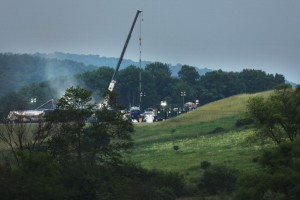New Study Examines Link Between Fracking and Arsenic Contamination
-
Katie Colaneri
ProPublica is highlighting a new study this week from researchers at the University of Texas at Arlington that found high levels of arsenic in private drinking wells near unconventional drilling sites in the Barnett Shale.
The Texas study comes on the heels of new information about disagreements within U.S. Environmental Protection Agency over the quality of drinking water in Dimock, Pa. The Los Angeles Times reported that at least one staffer at the EPA’s Region 3 office in Philadelphia found links between groundwater contaminated with arsenic, methane and other substances to nearby gas drilling.
ProPublica published a Q&A with one of the authors of the new Texas study, Brian Fontenot who says his work is similar to a Duke University study of the Marcellus Shale region by Robert Jackson and Avner Vengosh that found methane levels were 17 times higher in drinking water wells in proximity to drilling sites. But the Duke study did not show a direct causation between fracking and contamination issues. Neither did the new Texas study.
Here’s what Fontenot tells ProPublica the take-home message is:
“We don’t want the public to take away from this that we have pegged fracking as the cause of these issues. But we have shown that these issues do occur in close relation, geographically, to natural gas extraction. And we have this historical database from pretty much the same exact areas that we sampled that never had these issues until the onset of all the fracking. We have about 16,000 active wells here in the Barnett Shale, and that’s all popped up in about the last decade, so it’s been a pretty dramatic increase.
We noticed that when you’re closer to a well, you’re more likely to have a problem, and that today’s samples have problems, while yesterday’s samples before the fracking showed up did not. So we think that the strongest argument we can say is that this needs more research.”

















